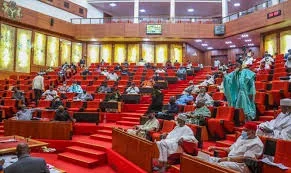
The Nigerian Senate is planning to amend the Electoral Act to allow for diaspora voting in presidential elections and make electronic transmission of results mandatory from the 2027 general elections. The move aims to enable citizens abroad, including those on essential services such as military and embassy staff, to vote. This decision comes after years of calls for Nigerians living overseas to participate in elections and for electronic result transmission from the BVAS (Biometric Verification Authentication System) machine.
The Senate also emphasized the need to unbundle the Independent National Electoral Commission (INEC) to enhance its efficiency. Furthermore, it recommended the introduction of sanctions for political parties failing to submit their party members' register within 30 days before party primaries, congresses, or conventions.
The Senate recognized the urgency of developing and enacting a comprehensive national security strategy that addresses security objectives, threats, and policy priorities. This strategy would address root causes of terrorism and promote community policing and engagement. The Senate also called for the establishment of independent oversight mechanisms for the security sector.
In the economic sphere, the Senate proposed the enactment of an Emergency Economic Intervention Bill to address foreign exchange management, inflation, economic growth, and job creation. It also highlighted the need for legislation defining the taxing rights of the three levels of government and promoting revenue optimization from non-oil sources, especially in the solid mineral sector.




